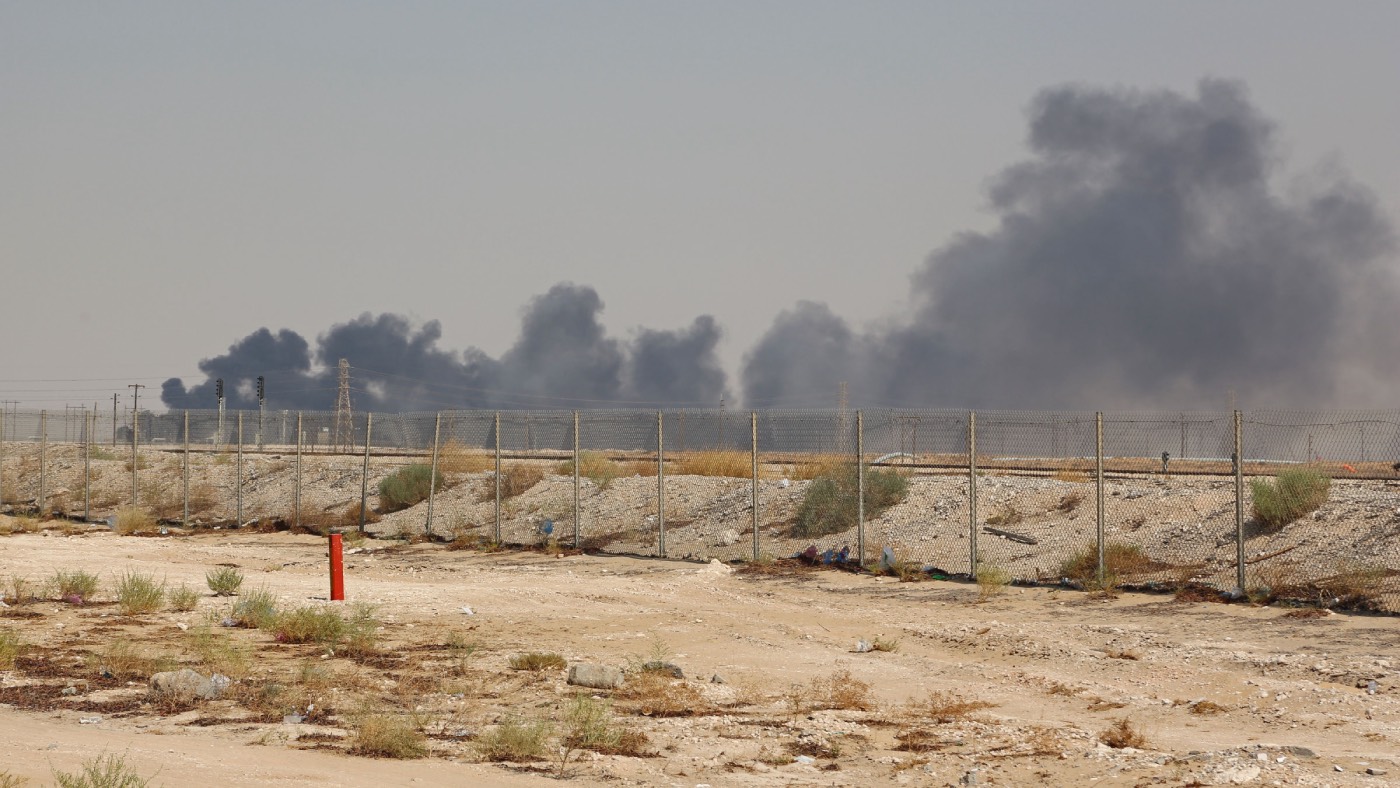Iran ‘ready for war’ as oil prices surge
Tehran denies US accusation that it was behind attack on Saudi oil facilities

A free daily email with the biggest news stories of the day – and the best features from TheWeek.com
You are now subscribed
Your newsletter sign-up was successful
Iran says that it is prepared for “fully fledged war” after Donald Trump’s administration accused it of launching drone attacks on two oil facilities in Saudi Arabia.
Responsibility for the attacks has been claimed by Yemen’s Iranian-aligned Houthi rebels but Mike Pompeo, the US Secretary of State, insists that Iran is to blame. In response, Tehran accused the US of “deceit” and making “blind accusations”.
The BBC says that the attacks “destabilise an already volatile region” and the ramifications could be huge.
The Week
Escape your echo chamber. Get the facts behind the news, plus analysis from multiple perspectives.

Sign up for The Week's Free Newsletters
From our morning news briefing to a weekly Good News Newsletter, get the best of The Week delivered directly to your inbox.
From our morning news briefing to a weekly Good News Newsletter, get the best of The Week delivered directly to your inbox.
The Times goes further, saying the dispute leaves the two powers “at their closest point to all-out conflict” since the White House reinstated sanctions last year and has “overturned hopes that the dismissal of John Bolton, the hawkish US national security adviser, might ease tensions”.
Writing on Twitter, Trump was in a bullish mood, insisting that the US knew who the culprit was and was “locked and loaded” but waiting to hear from the Saudi “Kingdom” on what it wanted to happen next. CNN said the president's tweet “appeared to raise the spectre of a US military response”.
Robert McNally, an energy analyst, told the New York Times that the oil facility attacks were more than “likely to put on ice” the possibility of talks between the US and Iran, which had seemed more possible after the departure of Bolton.
Meanwhile, oil prices have surged, hitting their highest in four months after the strikes destroyed more than 5% of global supply. Brent crude leapt 19% to $71.95 a barrel, while the other major benchmark, West Texas Intermediate, rose 15% to $63.34.
A free daily email with the biggest news stories of the day – and the best features from TheWeek.com
Abhishek Kumar, head of analytics at Interfax Energy in London, told the BBC: “The damage to facilities at Abqaiq and Khurais appears to be extensive, and it may be weeks before oil supplies are normalised.”
Although the Saudis are expected to draw on reserves in a bid to keep business as usual, Michael Tran, managing director of energy strategy at RBC Capital Markets in New York, said there has been a paradigm shift.
“Even if the outage normalises quickly, the threat of sidelining nearly 6% of global oil production is no longer a hypothetical, a black swan or a fat tail. Welcome back, risk premium,” he said.
Trump says he had authorised the use of oil from the US's emergency reserve. Market analysts have forecast that prices could reach $100 per barrel this week if normal production is not quickly resumed.
-
 The Week Unwrapped: Do the Freemasons have too much sway in the police force?
The Week Unwrapped: Do the Freemasons have too much sway in the police force?Podcast Plus, what does the growing popularity of prediction markets mean for the future? And why are UK film and TV workers struggling?
-
 Properties of the week: pretty thatched cottages
Properties of the week: pretty thatched cottagesThe Week Recommends Featuring homes in West Sussex, Dorset and Suffolk
-
 The week’s best photos
The week’s best photosIn Pictures An explosive meal, a carnival of joy, and more
-
 Will increasing tensions with Iran boil over into war?
Will increasing tensions with Iran boil over into war?Today’s Big Question President Donald Trump has recently been threatening the country
-
 Corruption: The spy sheikh and the president
Corruption: The spy sheikh and the presidentFeature Trump is at the center of another scandal
-
 Rubio boosts Orbán ahead of Hungary election
Rubio boosts Orbán ahead of Hungary electionSpeed Read Far-right nationalist Prime Minister Viktor Orbán is facing a tough re-election fight after many years in power
-
 Greenland’s capital becomes ground zero for the country’s diplomatic straits
Greenland’s capital becomes ground zero for the country’s diplomatic straitsIN THE SPOTLIGHT A flurry of new consular activity in Nuuk shows how important Greenland has become to Europeans’ anxiety about American imperialism
-
 Epstein files topple law CEO, roil UK government
Epstein files topple law CEO, roil UK governmentSpeed Read Peter Mandelson, Britain’s former ambassador to the US, is caught up in the scandal
-
 Iran and US prepare to meet after skirmishes
Iran and US prepare to meet after skirmishesSpeed Read The incident comes amid heightened tensions in the Middle East
-
 Which way will Trump go on Iran?
Which way will Trump go on Iran?Today’s Big Question Diplomatic talks set to be held in Turkey on Friday, but failure to reach an agreement could have ‘terrible’ global ramifications
-
 Israel retrieves final hostage’s body from Gaza
Israel retrieves final hostage’s body from GazaSpeed Read The 24-year-old police officer was killed during the initial Hamas attack